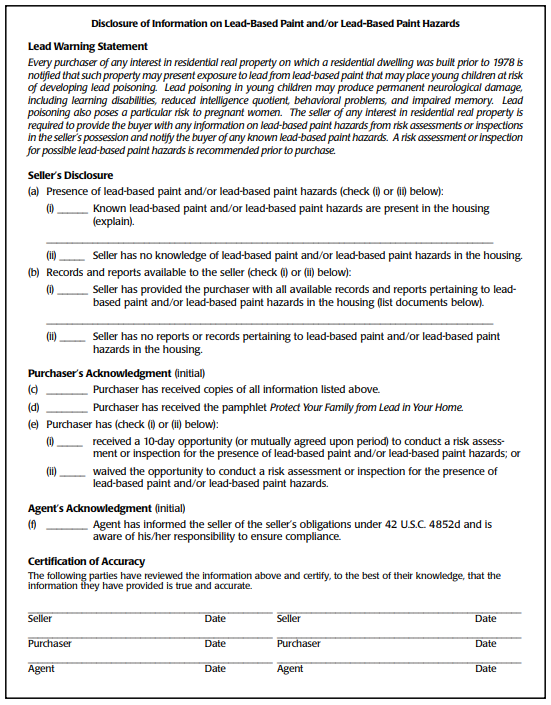Sellers Disclosure New Jersey


Home sellers have to complete sellers disclosure NJ when selling their homes in the state. The most common and relatively important thing is to list everything they know about the condition of the property.
If you are selling a property in New Jersey, here are all the seller disclosure requirements you need to know:
- Federal Disclosure of Information on Lead-Based Paint and/or Lead-Based Paint Hazards
- Seller’s Property Condition Disclosure Statement
Residential Lead-Based Paint Hazard Reduction Act

The Residential Lead-Based Paint Hazard Reduction Act passed in 1992 requires the disclosure of any lead-based paint or chipped paint in any housing built before 1978.
A seller submits lead-based paint disclosure under the US Federal law. The seller needs to disclose any information he has about the presence of any lead-based paint or chipped paint in the property to the best of his knowledge.

The seller may provide a 10-day period for the buyer to conduct a paint inspection or risk assessment for lead-based paint or related hazards by hiring qualified experts to inspect the property entirely. Although not all of them may have the resources to do so, it is still practical for the seller to disclose everything he knows about the property to avoid any legal real estate conflicts in the future.
Seller’s Property Condition Disclosure Statement
In New Jersey, there are no mandatory seller disclosure forms. But, under the common law, New Jersey courts made an exception to the rule. They came up with the Standard Form of Seller’s Property Condition Disclosure Statement.
The Seller’s Property Disclosure Statement identifies any known information that would affect the buyer’s decision if they knew about it. This information is called material facts. It is the seller’s obligation to tell his buyers about any known issues with the property. But he does not have to go out of his way to find problems hiring a home inspector.
The standard form is a 6-page document. It contains a provision for homes being sold in “as is” condition. This indicates that the seller feels the contract sale price takes into account the condition of the home and he does not intend to make any repairs to the property. However, buyers have a right, under a separate provision of the contract, to conduct inspections of the property to ascertain its condition.
A buyer can request repairs if he is not satisfied with the condition of the property. He may cancel the contract if the seller fails to make them.
Further, the buyer accepts the property in “as is” condition at the closing, the seller will not be held responsible for defects discovered afterward.
A seller must state the following:
The property is inhabitable;
Buyers generally assume that the property for sale is habitable. In this form, the seller implies that the property is habitable.
All the known, latent, material defects of the property;
In this section, the seller has to disclose any issues with the property may it be visible or not.
Latent material defects are things that are in a condition that wouldn’t present itself under normal circumstances. These defects are specific issues with a system or component of a residential property. They have a significant, adverse impact on the value of the property, or that poses an unreasonable risk to people.
Common examples of latent material defects are:
- Roof leak/damage
- Plumbing leaks
- Defective drywall
- Wood destroying organisms (active infestation and/or previous damage)
- Foundation issues
- HVAC system (not working)
- Mold
All the representations and disclosures covered in the sales contract:
This section includes representations or promises the seller is making about the property such as:
- All the systems and equipment may not be brand-new but in good working condition.
- Zoning laws apply to your property.
- All the structural changes made have supporting documents or permits from the municipality.
There’s no legal requirement to submit sellers disclosure NJ. A New Jersey home seller may choose to disclose any known material defects in the property in some other way, either orally or in writing.
Selling a home in New Jersey is not that complex. The required forms are not that complicated compared to the disclosures in other states. Therefore, in order to have the ideal transaction, make sure all information stated is accurate and thorough.
Note: All the information mentioned above is just a guide for real estate sellers in New Jersey. It is still best to seek legal advice from experts if you have any clarifications.
Related Keywords: nj home seller disclosure form, seller disclosure form nj, sellers disclosure nj, new jersey real estate disclosure form, selling a home in nj, selling real estate in nj, buying a house in jersey rules. house inspection nj, nj real estate contract, disclosure form meaning, disclosure definition law, what is a seller’s disclosure statement, seller’s statement of property condition
Related: how to fill out seller’s property disclosure, nj agreement of sale form, nj real estate contract of sale form, seller disclosure laws. seller disclosure after inspection, filling out seller’s disclosure, property disclosure law. homeowner disclosure form, nj real estate contract template, is a property disclosure statement required, seller disclosure statement form. seller’s disclosure of property condition form, required to disclose, time buyer, legally required. sellers complete, sales price, real estate attorney. stamp duty, full disclosure, real estate agent, obligation to disclose, selling a house as is in NJ, selling house as is in nj, home sale by owner websites, for sale by owner free listing sites cash for homes near me, free mls listing for sale by owner, best real estate sites